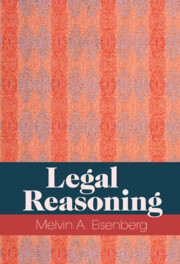Book contents
- Legal Reasoning
- Legal Reasoning
- Copyright page
- Dedication
- Contents
- Preface
- 1 A Brief Introduction to the Common Law
- 2 Rule-Based Legal Reasoning
- 3 Reasoning from Precedent and the Principle of Stare Decisis
- 4 How It Is Determined What Rule a Precedent Establishes
- 5 Reasoning from Authoritative Although Not Legally Binding Rules
- 6 The Role of Moral, Policy, and Empirical Propositions in Legal Reasoning, and the Judicial Adoption of New Legal Rules Based on Social Propositions
- 7 Legal Rules, Principles, and Standards
- 8 The Malleability of Common Law Rules
- 9 Hiving Off New Legal Rules from Established Legal Rules, Creating Exceptions to Established Rules, and Distinguishing
- 10 Analogy-Based Legal Reasoning
- 11 The Roles of Logic, Deduction, and Good Judgment in Legal Reasoning
- 12 Reasoning from Hypotheticals
- 13 Overruling
- Acknowledgments
- Index
12 - Reasoning from Hypotheticals
Published online by Cambridge University Press: 22 September 2022
- Legal Reasoning
- Legal Reasoning
- Copyright page
- Dedication
- Contents
- Preface
- 1 A Brief Introduction to the Common Law
- 2 Rule-Based Legal Reasoning
- 3 Reasoning from Precedent and the Principle of Stare Decisis
- 4 How It Is Determined What Rule a Precedent Establishes
- 5 Reasoning from Authoritative Although Not Legally Binding Rules
- 6 The Role of Moral, Policy, and Empirical Propositions in Legal Reasoning, and the Judicial Adoption of New Legal Rules Based on Social Propositions
- 7 Legal Rules, Principles, and Standards
- 8 The Malleability of Common Law Rules
- 9 Hiving Off New Legal Rules from Established Legal Rules, Creating Exceptions to Established Rules, and Distinguishing
- 10 Analogy-Based Legal Reasoning
- 11 The Roles of Logic, Deduction, and Good Judgment in Legal Reasoning
- 12 Reasoning from Hypotheticals
- 13 Overruling
- Acknowledgments
- Index
Summary
The term hypothetical means facts that are assumed rather than actual. The term a hypothetical means a scenario composed of such facts. Reasoning from hypotheticals takes two forms. In one form, a hypothetical is employed to view a case in a broader perspective to help decide the case. Hypotheticals in this form have three characteristics. First, the hypothetical differs from the case in its particulars, but as a matter of social morality, social policy, and experience the hypothetical is comparable to the case in its basic structure. Second, intuitively the hypothetical is easier to decide than the case. Third, because the hypothetical and the case are comparable as a matter of social propositions, the hypothetical and the case cannot be justifiably distinguished. That being so, the result in the case should be the same as the result in the hypothetical. In the second form of reasoning from hypotheticals, a hypothetical is employed to show that a case should not be decided in a certain way because if the case were decided that way, hypothetical similar cases would have to be decided the same way and deciding those cases the same way would be unsound.
- Type
- Chapter
- Information
- Legal Reasoning , pp. 90 - 97Publisher: Cambridge University PressPrint publication year: 2022

